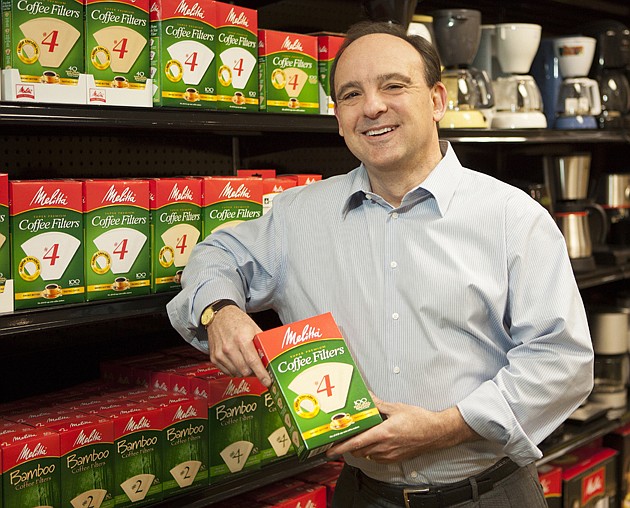Despite being the largest coffee filter brand worldwide and one of the premium coffee brands in the United States, Melitta is still looking for ways to stay ahead of its competition. That's what keeps its executives, including USA Vice President of Marketing Chris Hillman, up at night.
“We compete in very aggressive, dynamic categories,” Hillman says. To stay relevant, the company has to continuously innovate.
The U.S. branch of Melitta brings in more than $100 million in annual sales: half from filters produced in its manufacturing facilities in Clearwater, and half from coffee and coffee products produced in Cherry Hill, N.J. About 100 of Melitta USA's 120 employees work in Florida, according to Hillman.
The Clearwater-based branch has been in business more than 40 years as a part of the privately held Melitta Group, based in Germany. The U.S. arm accounts for about 7% of the group's total sales, according to the Melitta website.
Filter sales are the company's “bread and butter, our core competency,” Hillman says. Consumers can find Melitta coffee filters in almost all retail stores, yet despite the popularity of its standard filters, Hillman says the company needs to keep up with the change in coffee technology.
Some of that innovation is simple, such as creating a coffee filter with measurement markings on it to help people gauge how much coffee to use. But some of the changes in the industry have been destructive to traditional products' foothold: e.g., single-serving machines, such as the Keurig.
“The coffee market is transforming,” Hillman says. “Right now about 15% to 25% of U.S. households have single-serve coffee machines.” Hillman adds that number is projected to grow to 35% within four to five years.
For the last year, the company has put a significant investment in serving this growing market, in everything from machinery to marketing. The company decided to approach the market from three sides: market single-serve coffee cups to consumers, create single-serve coffee options for businesses, and offer to produce and package single-serve filters to other brands in the marketplace.
Melitta came up with two filter products for the single-serve market: the java jig, which is a paper filter solution that allows the consumer to use his or her own coffee in a Keurig-sized cup, and the e-filter, a semi-permanent non-paper filter.
It also created its own line of single-serve coffee, the Cafe de Europa. The single-serve cups are individually sealed in “freshness packs,” so when consumers open the pack, they can see and smell the coffee that they're about to brew. “It's more experiential and brings back more of the coffee-brewing experience for consumers,” Hillman says. The cups are also environmentally friendly and recyclable.
The company debuted the single-cup coffee products in May 2013, after installing new equipment at its Cherry Hill coffee roasting facility. The move follows a $10 million update the company made to its roasting facility in 2011 to increase capacity. Since then, the company has invested another $4 million to $5 million to branch out to single serve and to offer coffee roasting and packaging to other coffee brands.
As for distribution, the company releases new products in the Northeast because the region has the biggest markets for coffee, according to Hillman. The company will spend a year blanketing the Northeast before moving to the mid-Atlantic region, and eventually work its way down to Florida.
The firm markets the new products with Sunday newspaper inserts and in-store displays with coupons. The company also distributes home samples. “Once someone tries this product, we have them hooked,” Hillman says.
He declined to share figures, but Hillman says sales have steadily climbed each week through positive word of mouth on the new products. The product has received such positive feedback that the company has already ordered additional machines to manufacture the self-serve cups, Hillman says, with each machine costing millions of dollars.
“We knew we needed to adapt our portfolio,” Hillman says. “Single serve is our No.1 focus as a company going forward.”






